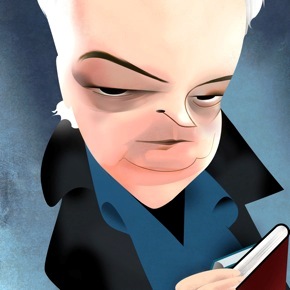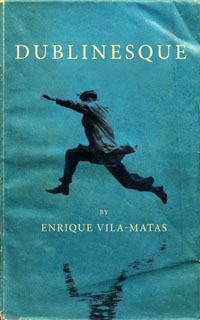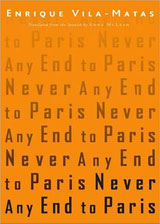| ENRIQUE VILA-MATAS | LA VIDA DE LOS OTROS | ||||||||||
|
|||||||||||
      |
THINGS FALL APART JOANNA KAVENNA At the start of" Dublinesque," the latest novel by Enrique Vila-Matas (translated from the Spanish by Anne McLean and Rosalind Harvey; New Directions), Riba, an aging Publisher who has recently battled alcoholism and closed down his publishing house, is invited to a literary festival in Lyon to speak on "the grave state of literary publishing in Europe." Riba "has a somewhat romantic image of himself and spends his life thinking that it's the end of an era, the end of the world, doubtless influenced by the sudden cessation of his activities." Arriving in Lyon, he avoids the festival entirely and holes up in his hotel room, working feverishly on "one of the dreams he'd had when he was in publishing and didn't have time for anything: to write a general theory of the novel." As soon as he finishes, he has a realization–"If one has the theory, why write the novel?"–and consigns his work to the wastebasket: "He held a secret, private funeral for his theory and for all the theories that had ever existed, and then left the city of Lyon without once having contacted the people who had invited him to speak." The novels of Vila-Matas, a Catalan writer who has established himself over four decades as arguably Spain's most significant contemporary literary figure, are full of comically self-defeating projects like this. His narrators make urgent attempts to prove a theory-to throw labels at the immensity of experience, to define the indefinable- but their efforts invariably collapse. And the novels enact a similar kind of self-defeat. In "Bartleby and Co." (2001), Vila-Matas's breakthrough novel, a virtuoso parody of critical taxonomy and listmaking, the narrator discourses on the "attraction towards nothingness that means that certain creators ... never manage to write"–a phenomenon epitomized by Bartleby, Melville's archetypically un-productive scrivener. Vila-Matas's narrator painstakingly crafts lists of "writers of the No"–de Quincey, Rimbaud, Kafka, Gide, Musil. Visiting New York, he becomes convinced that J. D. Salinger is sitting opposite him on a Fifth Avenue bus. Salinger, who "has spent thirty-six years in strict silence," is naturally a major literary hero to a man transfixed by aesthetic self-annihilation, and the narrator starts to imagine what he would say, if he could only pluck up the courage to speak: It occurred to me to approach Salinger and say to him, The narrator fails to approach Salinger, or even to establish whether it really is Salinger, and soon Salinger gets off the bus. The whole non-encounter has been an exercise in futility–one more example of the "art of the No" that so absorbs the narrator. Reading a Vila-Matas novel is like watching someone weave a beautiful tapestry with one hand while unravelling it just as expertly with the other. Until eight years ago, none of Vila-Matas's writing was available in English, though he was widely acclaimed throughout the Spanishspeaking world and in France. (In all, he has been translated into some thirty languages.) Since 2004, however, New Directions has been releasing his major novels here in fine, sympathetic English translations: "Bartleby & Co.," "Montano's Malady," "Never Any End to Paris," and now "Dublinesque." These works supply a useful introduction to an oeuvre that includes journalism, novels that read like essays, essays that read like novels, mock-heroic odysseys through Europe, the United States, and Latin America, and imaginary travelogues about places the author has never visited. Vila-Matas was born in 1948 in Barcelona, and began his career during Franco's nationalist and ultra-Catholic dictatorship. Franco suppressed opposition, stringently discouraged the use of any language other than Castilian Spanish, and made it a criminal offense for a woman to leave even a violent husband. Against this backdrop, Vila-Matas studied law and journalism and, by the late nineteen-sixties, was working at a film magazine, Fotogramas. While there, he wrote a series of mischievous and sometimes fictional essays, including an invented interview with Marlon Brando. So began a careerlong obsession with obliterating the line between reality and invention–a destabilizing tactic that one is tempted to associate with the experience of life under an oppressive regime. Like other Catalan authors who write in Castilian Spanish, such as the poet Jaime Gil de Biedma, Vila-Matas toys constantly with themes of identity and self-effacement. One of his core enterprises has been a kind of hiding in plain sight-the creation of a series of personal myths and teasing pseudo-autobiographies. As one narrator explains, "Life is too short to live a sufficient number of experiences, so you have to steal them." One after another, Vila-Matas's first-person narrators spill out their stories, but the reader is never any closer to knowing where Vila-Matas ends and a narrator begins. In an interview with Le Monde in 2011, Vila-Matas helpfully told the interviewer to "feel free to reinvent the whole thing entirely." In 1973, Vila-Matas published his first novel, 'Woman in the Mirror Contemplating the Landscape." The novel consisted of a single, uninterrupted sentence, and, the author claims, was read by only one person, who called it, perhaps euphemistically, "an exercise in style." The following year, Vila-Matas left Spain and went to Paris, where he rented a room from the French author Marguerite Duras. This interlude forms the basis of his novel "Never Any End to Paris" (2003), in which an aspirant bohemian goes to Paris and writes a novel, "The Lettered Assassin"–the actual title of Vila-Matas's second novel, from 1977–which, he posits, will kill anyone unfortunate enough to read it. The narrator sees his Parisian apprenticeship as "an ironic revision" of Ernest Hemingway's account of his time in the city in "A Moveable Feast": "Unlike Hemingway who was 'very poor and very happy' there, I was very poor and very unhappy." The novel' s possibly autobiographical reminiscences lead the narrator to wonder with disarming candor why he wants to remember his former self anyway: The poor, young man, handsome and stupid, who fooled himself on a daily basis and believed he'd been very lucky to be able to live in that filthy garret that Marguerite Duras rented him for the symbolic sum of a hundred francs a month, and I say symbolic because that's how I understood it or how I wanted to understand it, since I never paid any rent despite the logical, though luckily only sporadic, protests of my strange landlady. This "poor, young man" should, of course, have passed his time sitting at the feet of Duras, taking in her grand theories of art. Yet his French was so bad that "not always, but often, when Marguerite spoke to me ... I didn't understand a word, not a single word she said to me, not even her demands for the rent." Duras, her remarks lost or garbled in bad translation, becomes a fictional character, a compensatory fantasy. The present-day narrator regards his former self less with dewy-eyed indulgence than with red-faced horror: "a pretentious writer hiding his beginner's fragility ... a walking nightmare." He adds, "There were people in my neighborhood who, quite rightly, crossed the street when they saw me coming." "Never Any End to Paris" offers an extended meditation on the shifting self, the "deep and insurmountable gap" between youth and adulthood, and how the past cannot be regained but how this is probably a very good thing, because when the past is not elusive it is horribly embarrassing. In the end, the narrator realizes, there is nothing more absurd than striving portentously after the "reality" of oneself. Asked about "Dublinesque," Vila-Matas has said that it is about someone who "wants to hold a funeral for the world and discovers that, paradoxically, this is what allows you to have a future in life." The book, which overtly commemorates James Joyce, also more obliquely commemorates Vila-Matas's own temporary salvation. He has described being in the hospital while recovering from major surgery and dreaming that he was in Dublin, "a city I'd never been to before ... and I was on the floor in the doorway of a pub, crying." Allied with this dream was "an idea of rebirth." In the novel, Riba, the publisher protagonist, has an almost identical dream, which precipitates a Joycean pilgrimage to Dublin. As usual, Vila-Matas's use of his own biography isn't quite as straightforward as it seems. The book's title is an allusion to Philip Larkin's poem "Dublinesque," which is likewise an homage to the world of Joyce, and which, like Vila-Matas's book, came from a dream. "I just woke up and described it," Larkin claimed. What seems like confession may be literary myth, and the only thing we can be sure of is that Vila-Matas wants us to be unsure which is which. At one point in the novel, Riba hears a theory: Joyce's traditional, classic, Oedipal, conservative journey ... was replaced halfway through the twentieth century by a rectilinear journey: a sort of pilgrimage, a journey always moving forward, towards an impossible point in infinity, like a straight line advancing hesitantly into nothingness. For the rest of the novel, he aims at some kind of narrative coherence, but Vila-Matas keeps steering him back toward nothingness. Riba meanders, wastes hours on the Internet, feels his way from one disorienting encounter to another, teeters on the brink of plain disaster. Yet there is a consolation in the eddying freedom of his thoughts. For Riba, "each small incident, if one knows how to read it ... has a wondrous quality." He tries, wherever possible, to look for those hidden wonders in his daily life that, deep down, if he wants to, he's perfectly capable of finding ... At least all those years are worth something, all those years of understanding reading not just as a practice inseparable from his occupation as a publisher, but also as a way of being in the world: an instrument for interpreting, sequence after sequence, his day-to-day life. So "Dublinesque" becomes–in the best Joycean tradition–the expression of one man's unique "day-to-day life," his personal interpretation of reality, his quotidian oscillations between despair and elation. Vila-Matas, as in all his novels, grapples with the freedom of the individual, a freedom inevitably compromised by tragedy and failure but also graced by moments of alleviation, even happiness. "I do think irony is a powerful device for de-activating reality," one of Vila-Matas's narrators says. "Human kind," as T. S. Eliot put it, "cannot bear very much reality." But for Vila-Matas there are two types of reality–the hard-nosed general kind, which is "an unbearable burden," "fragmentary and without meaning," and an "internal realism," composed of our own fragile, fluttering inventions, which can be both beautiful and truly affecting. Perhaps this is why the experience of reading Vila-Matas is, for all his apparent pessimism, curiously uplifting. He has written that, for him, there are two sorts of books–straightforwardly realistic ones, which he associates with "a sort of disagreeable noise," and those which, without his quite knowing why, "transmit happiness." By lifting the heavy weight of the past, by setting irony against dogmatism and rigidity, Vila-Matas allows his characters, and us, to contemplate the future. THE NEW YORKER, SEPTEMBER 3, 2012 |
||||||||||
|
|||||||||||
| www.enriquevilamatas.com | |||||||||||